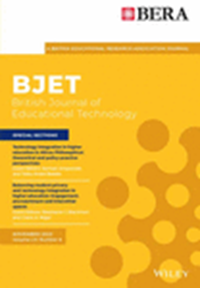Towards inclusivity in AI: A comparative study of cognitive engagement between marginalized female students and peers
Abstract
This study addresses the need for inclusive AI education by focusing on marginalized female students who historically lack access to learning opportunities in computing. It applies the theoretical framework of intersectionality to understand how gender, race and ethnicity intersect to shape these students' learning experiences and outcomes. Specifically, this study investigated 27 high-school students' cognitive engagement in machine learning practices. We conducted the Wilcoxon–Mann–Whitney test to explore differences in cognitive engagement between marginalized female students and their peers, employed comparative content analysis to delve into significant differences and analysed interview data thematically to gain deeper insights into students' machine learning model development processes. The findings indicated that, when engaging in machine learning practices requiring drawing diverse cultural perspectives, marginalized female students demonstrated significantly higher performance compared to their peers. In particular, marginalized female students exhibited strengths in holistic language analysis, paying attention to writers' intentions and recognizing cultural nuances in language. This study suggests that integrating language analysis and machine learning across subjects has the potential to empower marginalized female students and amplify their perspectives. Furthermore, it calls for a strengths-based approach to reshape the narrative of underrepresentation and promote equitable participation in machine learning and AI.
Practitioner notes
What is already known about this topic
- Female students, particularly those from underrepresented groups such as African American and Latina students, often experience low levels of cognitive engagement in computing.
- Marginalized female students possess unique strengths that, when nurtured, have the potential to not only transform their own learning experiences but also contribute to the advancement of the computing field.
- It is critical to empower marginalized female students in K-12 AI (ie, a subfield of computing) education, seeking to bridge the gender and racial disparity in AI.
What this paper adds
- Marginalized female students outperformed their peers in responding to machine learning questions related to feature analysis and feature distribution interpretation.
- When responding to these questions, they demonstrated a holistic approach to analysing language by considering interactions between features and writers' intentions.
- They drew on knowledge about how language was used to convey meaning in different cultural contexts.
Implications for practice and/or policy
- Educators should design learning environments that encourage students to draw upon their cultural backgrounds, linguistic insights and diverse experiences to enhance their engagement and performance in AI-related activities.
- Educators should strategically integrate language analysis and machine learning across different subjects to create interdisciplinary learning experiences that support students' exploration of the interplay among language, culture and AI.
- Educational institutions and policy initiatives should adopt a strengths-based approach that focuses on empowering marginalized female students by acknowledging their inherent abilities and diverse backgrounds.


 求助内容:
求助内容: 应助结果提醒方式:
应助结果提醒方式:


